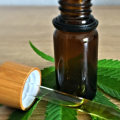CBD stops brain mechanisms that contribute to seizures by enhancing the release of the inhibitory neurotransmitter GABA. CBD increases anandamide in the brain. Increased levels of anandamide in the brain have been associated with a decrease in psychotic symptoms. Others spread myths about CBD over the Internet that it interacts with cannabinoid receptors, but they are completely wrong.
CBD stimulates the endocannabinoid system to produce more of its own cannabinoids and slows down their degradation. Delta-9-tetrahydrocannabinol (THC), on the other hand, binds to the CB1 and CB2 receptors, activating them and thus changing a person's thinking, memory, pleasure and perception of pain and concentration. These effects contribute to what we describe as a marijuana high. For example, chronic administration of CBD can result in a steady state, in which the plasticity of the brain system is balanced by the presence of CBD.
Because CBD lacks intoxication capacity and because its tolerance develops at a low rate, CBD is increasingly regarded as an advantageous substance for therapeutic use. Cannabis with CBD had a greater impact on functional connectivity between these two regions compared to cannabis without CBD (Freeman et al. The hypothesis that CBD might be affecting endocannabinoid signaling through NAPE-PLD is purely speculative, but given the unique pattern of global brain activity caused by CBD treatment may warrant research and has far-reaching implications. Neurodegenerative disorders can be slowed down by using CBD as an add-on treatment option; it is important to understand that CBD possesses anti-inflammatory properties, meaning that brain health problems related to inflammation can be significantly reduced.
In addition to this mechanism that can help CBD improve symptoms of epilepsy, CBD has been shown to have many other effects that could help with other diseases and disorders, as well as improve overall health. Therefore, the increase in Glx triggered by CBD in both groups could have been the result of CBD binding to TRPV1 neuronal receptors. Placebo (PLC) or CBD was assigned in a pseudorandom order, with approximately half of each group attending a placebo visit before CBD; and the other half attended a visit to CBD before placebo. When it comes to the details of how CBD achieves its effects, research around epilepsy will likely provide the most information, given that it has been investigated to the point where the FDA agreed to approve a CBD drug for treatment.
We included studies that examined the effects of CBD on brain function in healthy volunteers and people diagnosed with a psychiatric disorder, including both the effects of CBD alone and in direct comparison with those induced by A9-tetrahydrocannabinol (THC), the main psychoactive component of Cannabis. CBD is not intoxicating; in other words, CBD doesn't make people feel high, but it does allow them to get a lot of health benefits from this particular cannabinoid.


